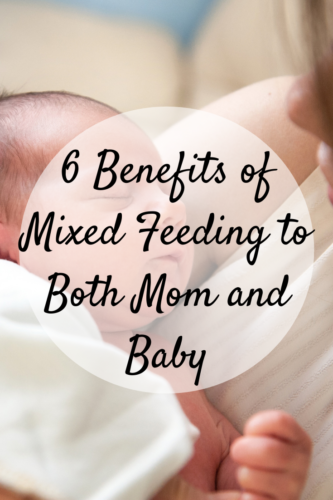
Mother Nature equipped women with the capability to feed their infants right after birth. Nonetheless, for one reason or another, such as health or socioeconomic factors, there are times when moms cannot breastfeed their babies full-time. The Centers for Disease Control and Prevention (CDC) reported that among the 46.9% of infants being breastfed exclusively through three months, only 25.6% continue on until six months. Again, there are several factors that influence this decline, but it doesn’t mean that babies are being fed any less. (1)
Some people think that the alternative to being unable to breastfeed exclusively is purely relying on formula for your child’s nourishment. However, it doesn’t have to be that way. Your child can enjoy the best of both worlds when you mix feed. This method provides immense benefits to mothers as well. With that said, in this article, you’ll learn the advantages you and your baby can reap when you go for mixed feeding.
Advantages for mothers
Here’s how mixed feeding could benefit mothers:
- Ample rest
Delivering a newborn baby is no easy feat. You expend a lot of energy and go through a lot of pain, regardless of whether you go through natural delivery or via C-section. That’s why moms need ample rest a few weeks and even months after giving birth.
However, exclusive breastfeeding can take a significant chunk of your time for rest, especially at night. Fortunately, products like S-26 Alula and other formula brands could give your baby the nourishment they need and allow you to rest when you have to.
Getting enough rest is crucial for mothers as much as it’s important for infants. You cannot provide the best care and love to your child if you aren’t feeling well.
- Breastfeed for longer
When you give yourself enough time to recuperate, you can give your baby your best physically, mentally, and emotionally. Mixed feeding allows your body to sustain breastfeeding for longer by boosting your supply slowly and surely as well as preventing you from burning out.
Some mothers naturally have less supply of milk because that’s just how their bodies are designed. Instead of beating yourself up for not being able to keep up with your baby’s demand, supplement their feeding with formula as you continue to recuperate and boost your breast milk supply.
- Easier weaning
It’s recommended that parents wait until their babies are six months old before they introduce solid food. This is because it’s at this age where they’ve achieved developmental milestones such as being able to hold their heads up, open their mouths when food is directed at them, and the ability to swallow. (2)
Once your child has gotten the hang of eating solids, you can then start weaning. Since they’re already accustomed to drinking from the bottle by mixed feeding, you won’t have any major problems when it comes to this transition period. The only issue that might arise is in choosing the best formula milk for their age.
Benefits for Babies
Meanwhile, babies can also enjoy the following benefits:
- Bond with the other parent
This feeding method offers families flexibility in terms of who will feed the baby. With this, the other parent, such as the dad or another guardian, can give them milk while the mother rests. This can serve as their quality time and allow the baby to get to know both parents’ voices, smells, and mannerisms well.
- Longer sleep
This actually depends on your baby and a lot of other several factors. For some, giving formula to infants before their nighttime sleep can lead to longer slumber. There have been studies that suggest formula-feeding can contribute to longer stretches for naps. (3)
Determine what works best for your baby. Who knows, they might be one of those who feel fuller for longer with formula milk. If so, then everybody’s happy and not sleep-deprived.
- Balanced nutrients
Breastfeeding is well and good for families that have the capacity to purchase healthy food and cook balanced meals. However, there are also instances when it might cost too much financially or with your energy and time.
As mentioned, mixed feeding allows your baby to reap the benefits of both worlds. They can enjoy the antibodies that breast milk provides naturally while also getting all the other nutrients that they need, which might have been absent otherwise from the mother’s diet.
Mixed feeding allows you and your child to get the benefits of both formula and breast milk. As long as you get the approval of your doctor and you choose the best product for your infant’s needs and preferences, then you can be sure that you’re giving your baby the nourishment that they require.
References
- “Breastfeeding Facts”, Source: https://www.cdc.gov/breastfeeding/data/facts.html
- “Starting Solid Foods”, Source: https://www.healthychildren.org/English/ages-stages/baby/feeding-nutrition/Pages/Starting-Solid-Foods.aspx
- “A Case for Combination Feeding”, Source: https://yourcub.com/combination-feeding/#The_Pros





Leave a Reply